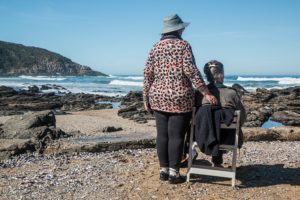Dealing with a dementia diagnosis can be a daunting and overwhelming experience, not only for the person affected but also for their loved ones. It’s likely that lots of various emotions will come into play, and it may feel difficult or even impossible to accept. If you or someone you know has been recently diagnosed with dementia, there are steps to keep in mind that can help to manage the condition and improve the quality of life.
Here are some tips on how to deal with dementia after being diagnosed
1. Understand the diagnosis
It’s important to have a clear understanding of what dementia is, the symptoms, and how it will affect daily life. Speak with a healthcare professional to learn more about the condition and how it may progress over time, and if you can, using the internet to evaluate a range of trusted resources, such as the NHS Dementia Guide.
2. Plan for the future
After a dementia diagnosis, it’s essential to plan for the future and make decisions about care, finances, and legal matters. It’s best to do this as soon as possible to ensure that the person with dementia has a say in their future and receives the care they need. Gov UK provides information and advice on topics such as power of attorney and social care assessments.
3. Seek support
Dealing with a dementia diagnosis can be emotionally and physically challenging. Seek support from family, friends, and healthcare professionals to help manage the condition and provide assistance when needed. Joining a local support group can also provide a sense of community and help you connect with others in similar situations.
4. Make lifestyle changes
Making lifestyle changes can help manage the symptoms of dementia and improve overall health and well-being. This may include regular exercise, a healthy diet, and staying mentally active. The NHS provides guidelines on healthy eating and exercise for older adults.
5. Stay socially connected
Social connections are essential for maintaining a good quality of life for someone with dementia. Encourage social activities such as group outings or visits from friends and family, within reason and at a quantity that suits them. Joining a local dementia-friendly group or participating in activities can help reduce isolation and provide a sense of purpose.
6. Take time for self-care
Caring for someone with dementia can be demanding and stressful. It’s essential to take time for self-care to prevent burnout and maintain mental health. This may include taking breaks, practicing relaxation techniques, allowing time to yourself while someone else helps out, or seeking counselling or therapy.
To summarise, a dementia diagnosis can be challenging, but there are steps you can take to manage the condition and improve quality of life. Understanding the diagnosis, planning for the future, seeking support, making lifestyle changes, staying socially connected, and taking time for self-care are all essential steps in dealing with dementia. Remember that support and resources are available, and with the right strategies, it is possible to live well with dementia.
Sources
- NHS. (2022). Dementia Guide. https://www.nhs.uk/conditions/dementia/
- Alzheimer’s Society. (2022). Understanding Dementia. https://www.alzheimers.org.uk/about-dementia/types-dementia/understanding-dementia
- Gov UK. (2022). Planning for the Future. https://www.gov.uk/government/collections/planning-for-the-future
- NHS. (2022). Exercise as you get older. https://www.nhs.uk/live-well/exercise/exercise-as-you-get-older/
- Alzheimer’s Society. (2022). Dementia-friendly communities. https://www.alzheimers.org.uk/get-support/dementia-friendly-communities
- NHS. (2022). Mental wellbeing in older people. https://www.nhs.uk/conditions/stress-anxiety-depression/mental-wellbeing-older-people/
Disclaimer
The purpose of the content created by Football Against Dementia is to provide guidance that we hope can be a help to many. However, Football Against Dementia are not professionals or doctors – if you require additional help and advice, please contact your GP.

